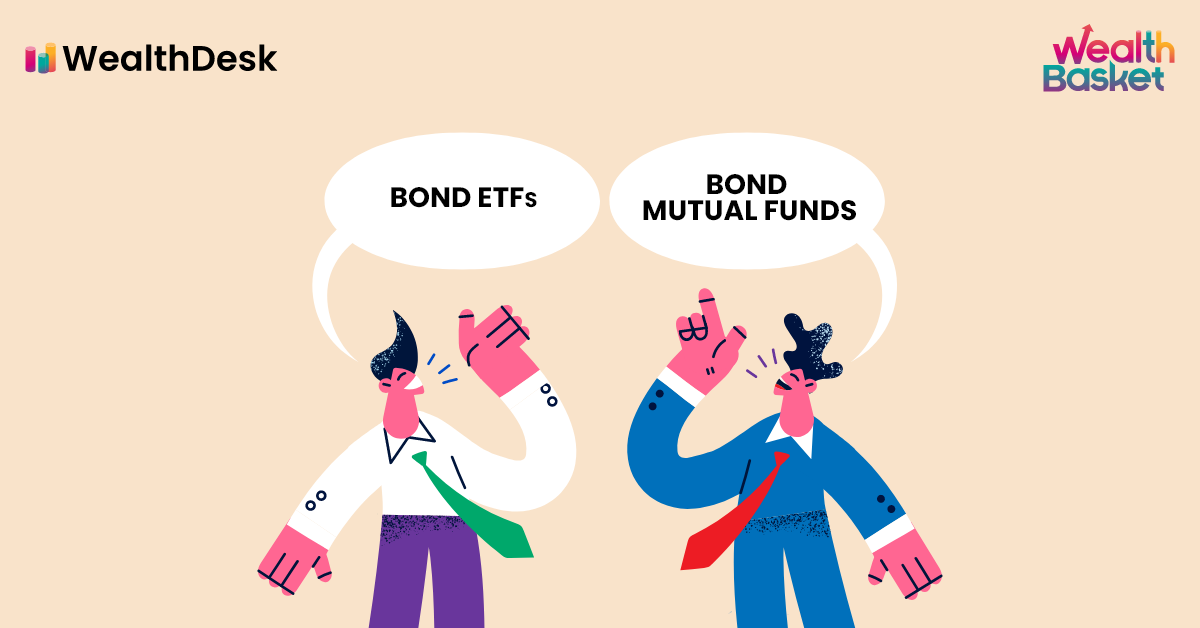From millennials to senior citizens, portfolio strategies are equally important regardless of age.
They have turned to exchange-traded funds (ETFs) or mutual funds for designing these portfolios. These instruments offer a wide range of options and are less risky than investing in individual stocks. Despite their many similarities, it remains to be seen which one is better: ETFs or mutual funds. Before we explain the difference between ETFs and mutual funds, let’s take a look at what ETFs are.
ETFs: What are they?
The ETF or exchange-traded fund is a diversified portfolio of securities that can be traded on a stock exchange. ETFs can also be called passively managed mutual funds. The ETFs can be either equity ETFs, bond ETFs, or options. Through a single fund, investors can gain access to stocks from different countries, regions, or sectors. The funds are traded at the Net Asset Value (NAV) of the underlying stocks they represent.
Should you invest in ETFs or Mutual Funds?
A few reasons why an investor should invest in ETFs are as follows:
- Buying and selling ETFs is similar to buying and selling other securities. Online brokers such as Wealthdesk make trading ETFs convenient for investors.
- ETFs replicate the performance of indices they follow. Therefore, investing in it is easy and simple.
- Since these are easy to invest in, easy to research, and simple to understand, there is no need for portfolio managers to oversee them. This is one of the primary advantages of ETFs over mutual funds.
- ETFs offer exposure to different countries, regions, and sectors, so investors can pick from a wide range of options. With a wide scope, portfolio diversification becomes easier.
- In comparing ETFs vs. mutual funds vs. index funds, the expense ratio is a key factor. Because index funds and ETFs are passively managed, they have lower expense ratios than mutual funds.
- Lastly, investors can trade ETFs whenever they want and not just once a day like traditional funds. Their ability to react quickly to market volatility gives them an advantage over mutual or index funds.
Now that we have explained the advantages of ETFs, let’s look at some factors and determine if it is better to choose them over mutual funds.
Which is better: ETF or MUTUAL FUND?
Both investment strategies, mutual funds, and ETFs have their pros and cons. Hence, a detailed comparison of ETF VS MF should be done before choosing an investment strategy. A potential investor should consider the following factors:
- Tax benefit
The tax advantage benefit point can be seen by analyzing capital gains ETFs vs mutual funds. ETFs are more tax-efficient than mutual funds. An investor selling an ETF is similar to an investor selling a stock on the stock exchange. A real sale of securities does not take place. Therefore, no capital gains. Usually, when an ETF has to rebalance its portfolio, capital gains are generated. For mutual funds, however, this is not the case. Mutual funds that are actively managed experience a lot of redemptions. To meet the cash requirement for redemption, the mutual fund must sell securities. As a result, capital gains are attracted frequently.
- The flexibility of trading hours
An investor who invests in open-ended mutual funds learns the NAV only at the end of the trading day. Therefore, they only know the selling or buying price of the share at the close of the market. Or, once a day. Nonetheless, some people need greater flexibility to trade more than once a day. ETFs make this possible. With instant knowledge of the buying/selling price, ETF investors can adjust their allocations based on the market’s movement within a day.
- Automated transactions
An automatic transaction plan is like a regular contribution to an investment without any effort on the part of the investor.
Your investments will grow as a result of an automatic investment plan without the funds being wasted on non-essential activities. Contrary to ETFs or mutual funds provide their investors with a variety of automatic investment options.
- Wider scope
Mutual funds have been around longer than ETFs. Furthermore, ETFs usually include passively managed funds. However, mutual funds offer both active and passive investment options. Depending on the investor’s financial goals and risk appetite, these can even be tailored to meet their needs.
- Operating costs
Among the operating costs are fund management fees, portfolio manager fees, marketing fees, loading fees, brokerage commission fees, and much more. Considering ETFs commonly contain passively managed funds, some fees relating to portfolio managers are reduced. As a result, the overall expense ratio is reduced in comparison to mutual funds.
- Overall Returns
An ETF mimics the performance of the index it tracks. This implies neither they are under-performing nor over-performing the index. In other words, ETF returns are limited to the tracking index returns. On the other hand, mutual funds have no such limit on the maximum return they may generate.
- Risk profile
As a general rule, both investment profiles carry inherent risks. Since ETFs are passively managed, the aim is to mimic the index, not to beat the market like actively managed mutual funds. Compared to mutual funds, this makes ETFs relatively less risky.
- Investment
Investors don’t need to worry about a minimum investment amount when investing in ETFs. But this is not the case with mutual funds. Some mutual funds require investors to invest a minimum amount before they can be part of the mutual fund.
Final thoughts
From the above article, you must have realized that both mutual funds and exchange-traded funds are great investment tools to diversify your portfolio. With both of these strategies, investors get access to worldwide sectors at a low cost. Hence, examine all the factors involved when comparing ETFs vs mutual funds in India, and then choose which is best for your needs.
Additionally, when discussing ETF vs mutual funds, it is
not compulsory to choose one over the other. Combining
both is always an option when building a
portfolio.
Conduct your in-depth research and
start investing in ETFs by visiting the
WealthDesk website.
WealthDesk provides a researched-backed mix of stocks
and ETF portfolios curated by SEBI registered investment
professionals, which helps you diversify the portfolio
and improve the returns on your investments.
FAQs
Yes, ETFs can be a good option for building a retirement portfolio. ETFs offer retail investors a cost-effective way to invest in various sectors. Now, investors seek liquidity when they retire. Compared with mutual funds, ETFs offer low-risk income and high liquidity.
Yes, ETFs pay dividends, and they establish a record date, ex-dividend date, and cumulative dividend date for their investors. Dividends can be paid out in cash or as additional shares. This is usually done every quarter. In most cases, ETFs will reinvest instead of paying out dividends.
ETFs do charge fees, but they’re generally lower than mutual funds. The expense ratio varies between 0.5% and 1% in ETFs, making it more attractive than mutual funds. Operational costs, brokerage commissions, spreads, premiums, and discount volatility are some of the common costs associated with ETFs.
In unfortunate circumstances, where a fund’s expenses outweigh its income, it may have to close. Investors are given ample time to decide on their positions before an ETF closes. Investors can liquidate their shares or receive a check for the balance in the fund. It will be a cumbersome and expensive process, but an investor doesn’t lose his entire investment. It is also possible for other companies to take over the management of such ETFs.
Actively managed ETFs have emerged as a competitive
choice for investors who prefer the flexibility they
offer and keep the diversification feature of mutual
funds. However, mutual funds have remained the top
dog based on assets under management (AUM) owing to
their prominence in retirement plans. Ultimately the
well managed fund, be it ETFs or mutual funds,
depends on the ability of the fund manager to beat
the market and deliver on the investment needs of
the investor.
To understand the
differences in volatility, the risk to return ratio,
and the returns earned above the benchmark index
returns (also called Alpha), looking at Beta, and
Sharpe Ratio of funds would help to an extent.
Allow
us to guide you through your portfolio-building
journey. At WealthDesk you’ll find assistance
from some of the finest portfolio managers in
managing your investments.


















